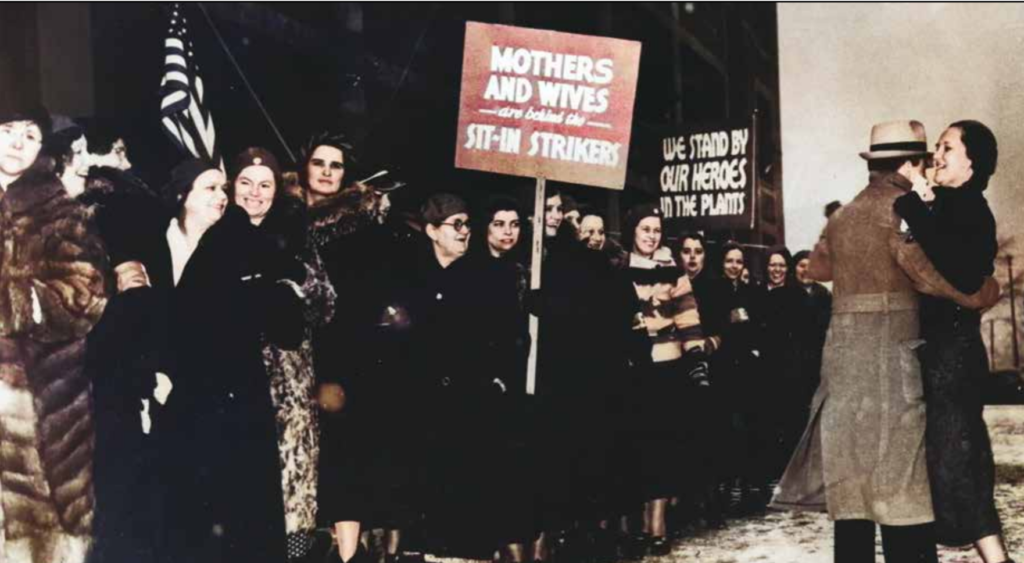
With Babies and Banners
By Erica Eckart
March is Women’s History Month. This month we take a deep dive into the documentary movie called With Babies and Banners. This documentary is a first-hand account of the women’s role in the Flint sit-down strike of 1937 which was a pivotal time in history for the UAW and known as “the strike heard around the world.”
Most of us have seen the movie Brothers on the Line when we came through orientation here at Ford. This movie was a documentary about the beginning of the UAW, when the Reuther brothers came together to form the UAW at the big three. While the movie and history were powerful, it didn’t give much information on the significant role that the women played during this time.
Picture a time when women were seen as nothing but housewives and mothers. They couldn’t vote, couldn’t have a say in their own lives at home, much less in a working environment. They were allowed to work but were paid a significantly lower wage than men even though they were doing the same
jobs. In the workplace, women were discriminated against. A common practice at GM was women only getting hired if they were pretty, as a result, management would exploit these women and hold their jobs over their head to get what they wanted from them.
On top of the discrimination against women, the company didn’t provide much better for the men. Sure, they were paid more than the women but neither had benefits at that time. Sometimes they would work for two hours and go home, no sick benefits, no health and welfare programs, no unemployment benefits or anything.
All those benefits were gained after the UAW was founded. Before the sit-down strike, during the organizing process, GM had an actual policy where they would create suspicion in the wives about where their husbands were and what they were doing when in actuality they were attending union meetings. The company deliberately tried to cause division in the home lives of these men to prevent them from participating. “They would have done anything to cut down the union so it wouldn’t get as strong as it did.”
In one woman’s account, she spoke about how her husband didn’t come home for two days. She found out there was a strike by hearing about it over the radio. The women decided that they were going to join the strike just like the men and they began to organize. They brought food, clothes, coffee,
and even brought their children and could be seen holding their babies up to the windows so their fathers could have a visit. They organized “the
children’s picket line” where they held signs that read “Our daddy strikes for us little tykes” which garnered national attention.
As the strike gained momentum, so did the women. They called a meeting with the women in the neighborhood and decided they had to do something. “We’re going to have to form an emergency brigade to help our men.” There were 50 women that signed up that night, all wives, daughters, sisters and even women who had no one, but believed in the cause, all ages ranging between 16 and 65.
Eventually they went from 50 to 400 women. At one point Nellie Bessie, the LT. of the Women’s Emergency Brigade could be seen riding around in a car with a microphone, yelling to the crowd “Women of the city of Flint, break through those picket lines and come down here and stand by your husbands, brothers and sons.” As police started shooting tear gas into the buildings, women can be seen busting out the windows with baseball bats so that their men could breathe. At one point the Women blocked a gate so that the police couldn’t enter.
They held the line by distracting the police with questions like “if it was your son or brother or father in there, wouldn’t you want to protect them?”. They stalled and held the line until they heard the solidarity forever victory song coming from the strikers. They had saved the situation. They stayed put until GM agreed to bargain. It was then that the UAW was born. These women organized an emergency brigade to fight for themselves,
their men, and to prove that they too could make a stand on what they believed in. They risked their lives to stand together and make a better way of life that we all tend to take for granted today.
As the contract’s end approaches, I encourage everyone to think about how bad it would be if we didn’t have our union. Realize that everything we have can be stripped away if we don’t stick together. Solidarity is victory and if the brave men and women of the 1930’s can do it then we sure can.
